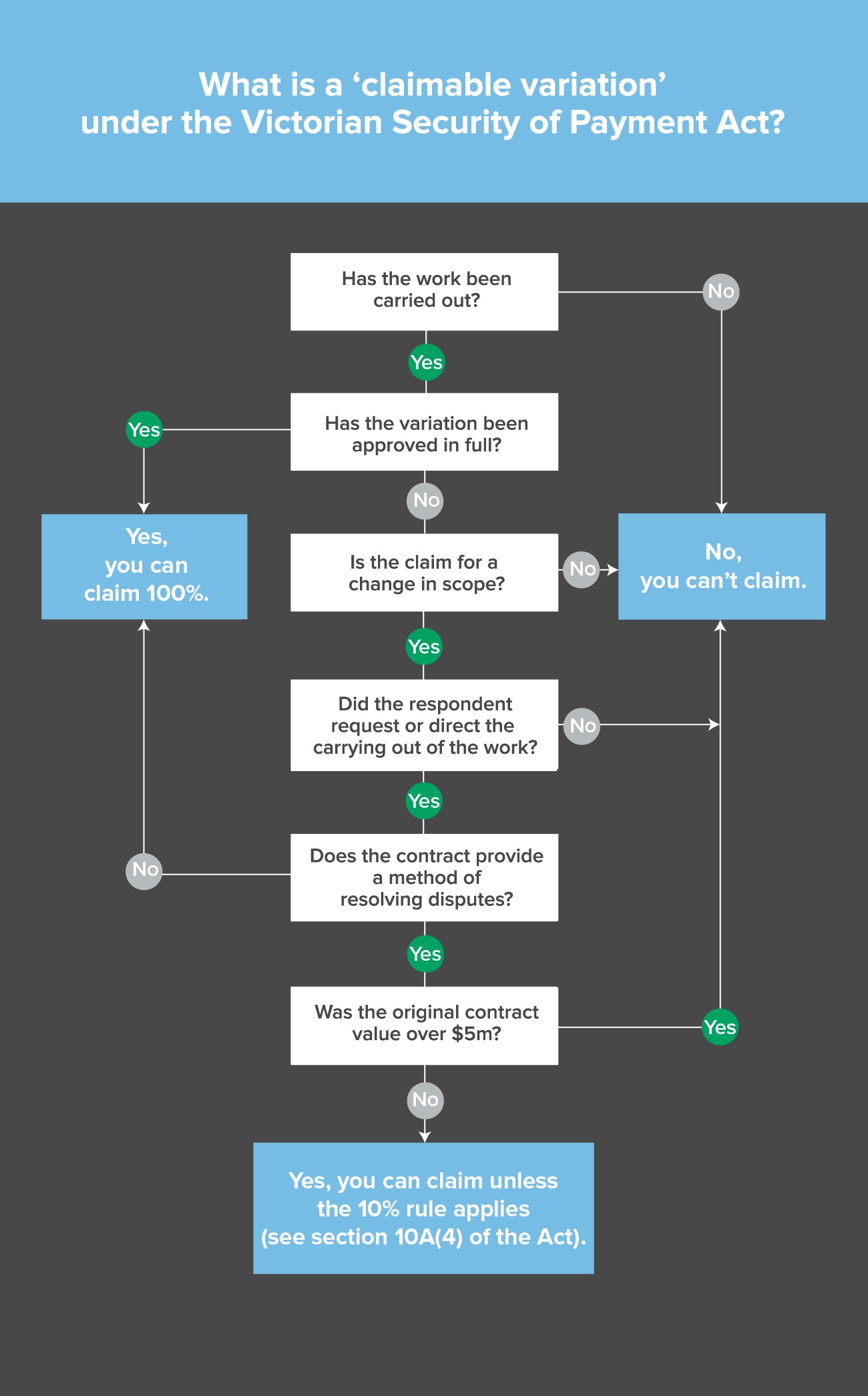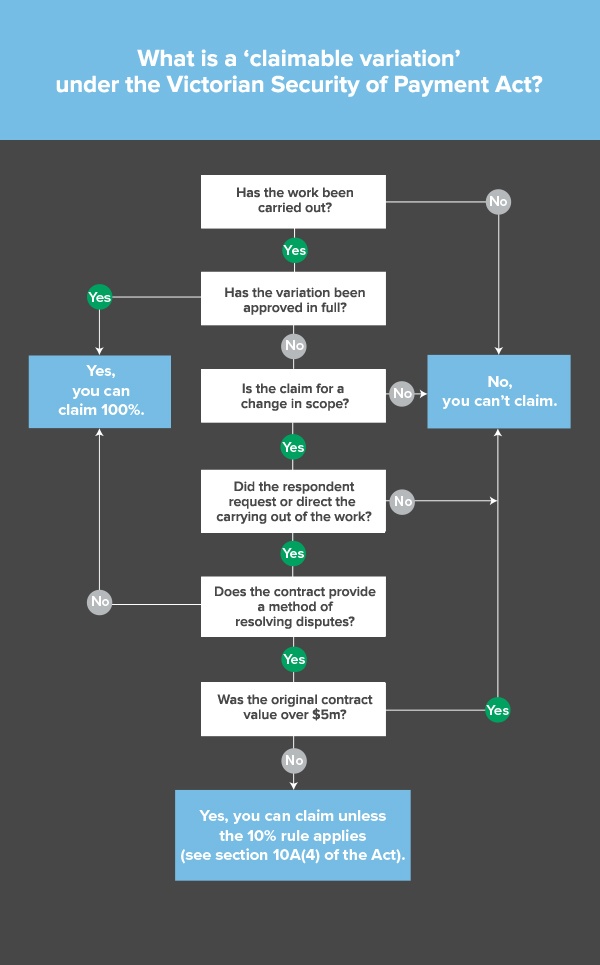Victoria’s security of payment is different to its interstate equivalents, in that it prohibits certain types of variation from being claimed under the Act. The provisions are complex, and confusing. This article explains how they work.
What is a ‘claimable variation’?
A variation is defined in the Act as ‘a change in the scope of work to be carried out or the goods or services to be supplied, under the contract.’ Unless the variation involves a change in the scope, it cannot be claimed.
In addition to there being a change in scope, the variation must also be a ‘claimable variation’.
Section 10A of the Act divides ‘claimable variations’ into two classes. Class 1 variations are variations on which the parties agree. Class 2 variations are variations on which the parties do not agree. And this is where the confusion typically starts.
The drafting of section 10A is notoriously complicated. Justice Vickery has described it as ‘a remarkable piece of legislation’, noting:
“[it] takes several readings to digest the steps required to apply the provision, and several more steps, combined with a respectable prowess in the science of numbers, to apply it to the case at hand.”
The flowchart below attempts to explain how it works.


What is a class 1 variation?
A variation falls into class 1, and may be claimed in a payment claim, if the parties agree on all of the following:
- the claimant has carried out the work or supplied the goods or services;
- the scope of work that has been carried out or the goods and services that have been supplied;
- the work or the supply of goods or services is a variation to the contract;
- the claimant is entitled to be paid for the variation;
- the value of the variation or the method of valuation; and
- the time for payment.
In essence, all aspects of the variation need to be agreed to fall into the first class of claimable variation.
What is a class 2 variation?
A variation is classified as a class 2 variation if it is not a class 1 variation, and where:
- the claimant has carried out the work or supplied the goods and services under the contract; and
- that work was requested or directed to be carried out by the respondent or a person authorised by the respondent in accordance with the contract.
Typically, a class 2 variation arises where a contractor claims to have been requested to perform work, and performs that work, but where its claim for payment is rejected.
However, there are limits on when class 2 variations can be claimed, as we explain below.
When can a class 2 variation be claimed?
Whether a class 2 variation can be pursued under the security of payment legislation will depend on:
- the value of your contract;
- whether the contract contains a ‘method of resolving disputes’; and
- in some cases, the value of class 2 variations that have already been claimed.
Contracts over $5m
If the contract sum is more than $5 million at the time the contract is entered into, class 2 variations cannot be claimed if the contract contains a method of resolving disputes. (We explain this concept further below.)
This is designed to encourage parties to large contracts to rely on the dispute resolution mechanisms within the contract, apparently to avoid potential ‘log jams’ in the security of payment adjudication system.
If the contract is over $5 million and there is no method for resolving disputes, there is no limit on the value of class 2 variations that can be claimed.
Contracts less than $150,000
If the contract sum is less than $150,000 at the time the contract is entered into, the Act will apply to all disputed variations.
Contracts between $150,000 and $5m – the 10% rule
If the contract sum is more than $150,000 but less than $5 million at the time the contract is entered into, there may be a limit on the value of class 2 variations that can be claimed. This again depends on whether the contract contains a method of resolving disputes.
If the contract does contain a method of resolving disputes, the value of class 2 variations that can be claimed under the Act is capped at 10% of the original contract sum. All other claims must be resolved under the dispute resolution process prescribed by the contract.
If there is no method for resolving disputes, there is no limit on the value of class 2 variations that can be claimed.
Example
For example, say a construction contract has an original contract sum of $2.5 million and contains a dispute resolution clause. Assume that the contractor claims a variation at $300,000, which is disputed by the principal.
The contractor’s claim exceeds 10% of the contract sum (i.e. $250,000). Because the contract sum exceeds $150,000 and the contract has a dispute resolution clause, the disputed variation will not be a claimable variation under the Act.
If the contract did not contain a dispute resolution clause, the disputed variation would be a claimable variation under the Act.
What is a ‘method of resolving disputes under the contract’?
To be a valid method of resolving disputes for the purposes of section 10A, the Court has found that three requirements must be satisfied. There must be:
- A process which could be described as a ‘method’ of dispute resolution;
- A process which is capable of resulting in a binding resolution of the dispute; and
- A process which the contract makes it a binding obligation for the parties to enter upon and participate in.
In SSC Plenty Road Pty Ltd v Construction Engineering (Aust) Pty Ltd, Vickery J explained that the process must have 'mandatory steps … which result in the production of a binding decision by a third party appointed under the contract.' Mediation does not satisfy this requirement. This is because, unlike arbitration or expert determination, mediation is not guaranteed to produce a binding outcome. (Click here to read more about the differences between mediation, arbitration and expert determination.)
How can excluded amounts be claimed?
A variation that cannot be claimed under the Act is an ‘excluded amount’. Excluded amounts must not be included in payment claims, and they must not be taken into account by an adjudicator in determining an adjudication application.
Excluded amounts can however be claimed under the contract. A dispute resolution process will dictate how the claim can be pursued.
Key Takeaways
If you are a contractor seeking to recover payment for disputed variations, the security of payment legislation may be an effective avenue – but this will depend on the value of the contract, the nature of your claims and whether the contract has a dispute resolution clause, as described above. It is important to understand how your claims fit within the legislative framework. Otherwise you may find yourself wasting time and money pursuing claims under the Act that are not allowed.
Similarly, if you are a principal or head contractor receiving claims (or an adjudication application) that involve disputed variations, the first thing you should do is consider whether the claims include ‘excluded amounts’ under the Act. Depending on the size and terms of your contract, the nature of the variations and the circumstances in which they arose, this may be your most effective way to defend a claim brought under the Act.






